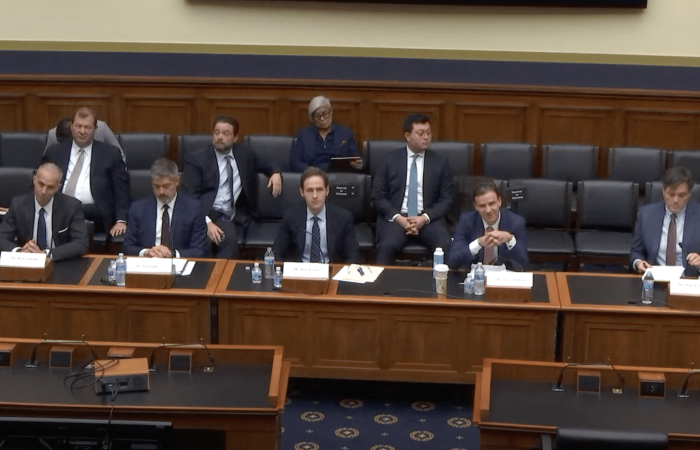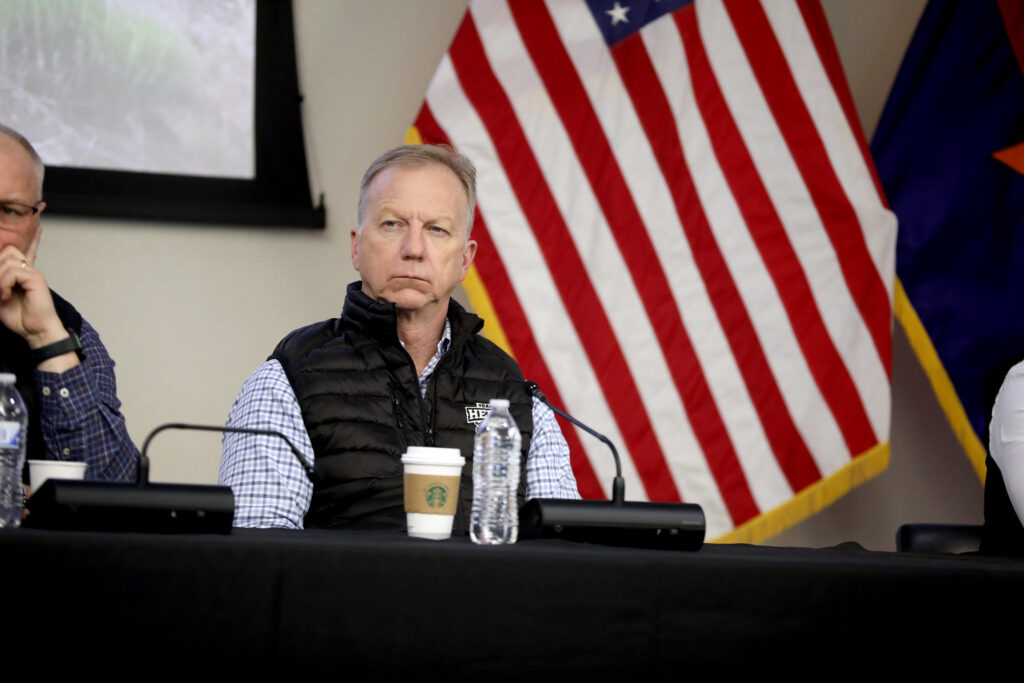The Financial Services Committee held a hearing on February 7, 2023, titled “Combatting the Economic Threat from China,” which addressed the dangers China’s economic and geopolitical activities posed to the U.S. and explored potential measures to mitigate these risks. The hearing touched on up to 17 legislation proposals capturing the utilization of investment screening, sanctions, investment policies and supervision, international financial institutions, international financial flows, export financing, and the Defense Production Act.
Notable Statements:
- Chairman of the Committee, Mr. Patrick McHenry, stated that combating the economic threat from China is a priority for Congress.
- The U.S.’s military strength and cultural power are fueled by a robust economic system of “free people in free markets.” Thus, carefully evaluating policy proposals is vital to prevent jeopardizing America’s economic vibrancy or to cause allies to question this commitment.
- He stressed the need to prevent China from rewriting international rules, ignoring debt transparency and multilateral standards with impunity, or exerting malign influence in international financial institutions.
- Ranking member of the Committee, Ms. Maxine Waters, echoed the potential bipartisan agreement that further legislation is required to ensure that U.S. companies, such as hedge funds, private equity funds, and Wall Street, are not invested in ways that hurt the economy or fund adversarial actions of the Chinese government.
- She also called for the U.S. to reassert its leadership and displace China as a key supplier of critical equipment for technologies, especially green technology, to fight climate change.
- Commenting on the defensive measures the U.S. can leverage against China, especially through outbound investment screening and holding China accountable, the panel calls for layers of legislation upgrade.
- On the Chinese Military and Surveillance Company Sanctions Act introduced by Rep. Andy Barr, the panel agreed on the escalating prohibition of financial interaction from the U.S. to undermine potential benefits to Chinese military capability.
- Mr. Clete Willems, Partner at Akin Gump Strass Hauer & Feld, argued that imposing sanctions on entities listed by the Treasury Department as Chinese Military-Industrial Complex Companies should improve in “closing the gaps in outbound investment through venture capital, private equity, and debt,” and drawing in companies beyond the technology surveillance and defense material sector that also pose national security threats.
- In the same rationale, the committee revisited the bipartisan agreement on the No Energy Revenues for Russian Hostilities Act by Rep. Barr, which prohibits sanctioned Russian banks from processing energy-related transactions, including with Chinese purchasers, through the U.S. financial system.
- The bipartisan effort in the draft of the China Financial Threat Mitigation Act of 2023 sponsored by Rep. Abigail Davis Spanberger would require the Treasury Secretary to report to Congress on global economic risks emanating from the Chinese financial sector as a mechanism for monitoring and mitigating financial stability risks.
- Mr. Peter Harrell, former Senior Director for International Economics and Competitiveness at the National Security Council and National Economic Council, though agreed with closer evaluation and monitoring of Chinese-source economic and financial risks, expressed concerns over the free-market boundary and administrative feasibility of a potential large-scope financial transaction surveillance project. The witnesses echoed similar concerns when addressing Congressman John Rose’s proposal to require all-level funds to disclose exposure to Chinese-related investment risk.
- Congresswoman Ms.Monica De La Cruz specifically proposed a draft of Preventing the Financing of Illegal Synthetic Drugs Act, which will instruct the Comptroller General of the United States to conduct a study on illicit financing in connection with the trafficking of synthetic drugs, including fentanyl.
- On multilateral coordination, as per the Chinese Currency Accountability Act by Rep. Warren Davidson and further the drafted IMF Reform and Integrity Act by Congressman Bill Huizenga, Congressman Warren argued that given China’s control over its exchange rate and currency manipulation, the U.S. and its allies should oppose an increase in the weight of China’s Renminbi in the currency basket of IMF’s Special Drawing Rights.
- Mr. Clete Willems suggested the U.S. generate criteria to pick allies for multilateral collaboration against RMB promotion in the light of the International Financial Institutions Governance Act by Rep. French Hill, which would allow U.S. representatives at the international financial institutions to waive certain mandates that impede U.S. effectiveness in working with allies and countering China.
- On the Chinese Military and Surveillance Company Sanctions Act introduced by Rep. Andy Barr, the panel agreed on the escalating prohibition of financial interaction from the U.S. to undermine potential benefits to Chinese military capability.
- Among a spread of potential “offensive measures” against China, the highlights include:
- The drafted Neutralizing Unfair Chinese Export Subsidies Act by Rep. Zach Nunn would require the Treasury Secretary to develop a detailed strategy and timeline to work with allies in order to seek China’s compliance with international export subsidy standards.
- Mr. Clete Willems proposed decreasing dependence on Chinese supply chains by adopting proactive trade strategies with nations in the Indo-Pacific region and enhancing law enforcement and regulatory cooperation. He emphasized that market access trade agreements, which reduce barriers to U.S. exports in third-country markets, are vital for supply chain objectives and provide incentives for companies to shift away from China.
- Chairman of the Committee, Mr. Patrick McHenry, proposed the International Nuclear Energy Financing Act, H.R. 806, which would require the Treasury Secretary to advocate for nuclear energy financing at the World Bank as an alternative to Chinese support for nuclear projects internationally.
- The committee has walked through a basket of legislation to deter China from aggressive action over Taiwan with consensus. The PROTECT Taiwan Act by Congressman Frank Lucas would mandate the Treasury Department, Federal Reserve, and Securities and Exchange Commission to push for China’s exclusion from international financial organizations like the G20, Bank for International Settlements, and others in case of a Chinese invasion of Taiwan. The Taiwan Non-Discrimination Act by Rep. Young Kim would require the U.S. to advocate for Taiwan’s membership and meaningful participation in the International Monetary Fund. Lastly, the Taiwan Conflict Deterrence Act by Rep. French Hill would necessitate public disclosure of the financial assets of top Chinese leaders if China invades Taiwan.
- The drafted Neutralizing Unfair Chinese Export Subsidies Act by Rep. Zach Nunn would require the Treasury Secretary to develop a detailed strategy and timeline to work with allies in order to seek China’s compliance with international export subsidy standards.
Background of Outbound Investment Screening:
Outbound investment review mechanisms first emerged in the U.S. during the congressional debates on the 2018 Export Control Reform Act (ECRA) and Foreign Investment Risk Review Modernization Act (FIRRMA).The proposals aimed to address concerns that the U.S.-based venture capital funds were facilitating China in cutting-edge technologies with military applications. After the failure of the initial proposal, the topic remains relevant, with several attempts made amid the summer of 2022 with the CHIPS and Science legislative debates and the 2023 Consolidated Appropriations Act. This March, the Biden administration is reported to be close to effecting an executive order (E.O.) to establish outbound investment review screening, which would be complemented by legislative support. The administration may narrow the E.O.’s scope to focus on semiconductors, artificial intelligence, and quantum technology, excluding biotechnology and battery technology.
Critics argue that outbound investment screening would substantially widen the scope of U.S. national security controls over investments traditionally considered purely economic objectives. Policymakers must find the balance between compliance costs for the U.S. private sector and the impact on close economic allies, while avoiding redundancy with existing trade and investment tools related to U.S. national security and economic policy.




